Does a House Need Gutters?
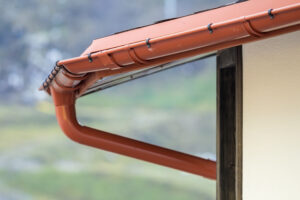 Gutters are one of those home features that you may not think about until they need to be replaced or cleaned. But do you really need them? It turns out that the answer is…it depends. If you live in an area with a lot of rain, snow, or leaves, gutters can help protect your home from water damage by channeling water away from your foundation. But if you don’t get much precipitation or have a sloped lot, gutters may not be necessary.
Gutters are one of those home features that you may not think about until they need to be replaced or cleaned. But do you really need them? It turns out that the answer is…it depends. If you live in an area with a lot of rain, snow, or leaves, gutters can help protect your home from water damage by channeling water away from your foundation. But if you don’t get much precipitation or have a sloped lot, gutters may not be necessary.
What do gutters do?
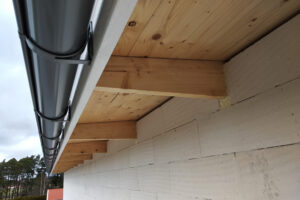 Your home’s gutters play an important role in protecting your home from water damage. Gutters channel water away from your home’s foundation and prevent it from seeping into your basement or crawlspace. They also help to prevent water from eroding your landscaping and flooding your yard.
Your home’s gutters play an important role in protecting your home from water damage. Gutters channel water away from your home’s foundation and prevent it from seeping into your basement or crawlspace. They also help to prevent water from eroding your landscaping and flooding your yard.
Gutters are typically made of aluminum, vinyl, or copper. They are available in a variety of colors to match your home’s exterior. Most gutters are installed by a professional contractor, although some do-it-yourselfers choose to install their own gutters.
If you live in an area that gets a lot of rain, you may want to consider installing gutter guards to keep leaves and other debris out of your gutters. Gutter guards can be purchased at most hardware stores and home improvement centers.

Different types of gutters you can use on your house
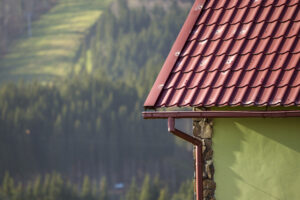 There are several types of gutters to choose from when you are looking to install or replace gutters in your home.
There are several types of gutters to choose from when you are looking to install or replace gutters in your home.
Seamless gutter. The most common type of gutter is the seamless gutter, which is made from a continuous stop of aluminum. Seam gutters are less likely to leak than traditional gutters because there are no joints or seams.
Aluminum gutter. An aluminum gutter is commonly used because it is durable and can withstand harsh weather conditions. It is also low maintenance and does not rust like other types of gutters. Aluminum gutters are also available in a variety of colors to match the exterior of your home.
Vinyl gutter. Vinyl gutters are another common type of gutters that is less expensive than aluminum gutters and they are easy to install. However, they are not as durable as aluminum gutters and can become brittle in cold weather.
Copper gutters. Copper gutters are durable, long-lasting, and require little maintenance. They will last for many years and will not rust or corrode.
How to maintain gutters
 Your gutters play an important role in keeping your home in good condition. They channel water away from your roof and foundation, preventing damage to your home. But gutters can become clogged with leaves and debris, causing them to overflow and leak. To prevent this, you need to clean your gutters regularly.
Your gutters play an important role in keeping your home in good condition. They channel water away from your roof and foundation, preventing damage to your home. But gutters can become clogged with leaves and debris, causing them to overflow and leak. To prevent this, you need to clean your gutters regularly.
Here are some tips on how to maintain your gutters:
1. Inspect your gutters at least once a year, and more often if you have trees near your house. Look for any cracks or holes, and repair them immediately.
2. If you see any leaves or debris in your gutters, remove them as soon as possible. A small brush can help you get rid of smaller pieces of debris. For larger items, you may need to use a hose or power washer.
Or if you’re worried about consistent gutter clogs, you can add gutter covers and they are relatively inexpensive. Diamond gutter covers have small diamond-shaped openings that best prevent leaves, pine needles, and other debris that can potentially clog your gutters.

Advantages and disadvantages
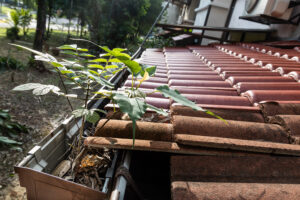 Most people think gutters are nothing more than an eyesore. However, there are several advantages of having gutters. For one, gutters help to protect your home from water damage. They also help to keep your foundation in good condition and can even help to reduce energy costs.
Most people think gutters are nothing more than an eyesore. However, there are several advantages of having gutters. For one, gutters help to protect your home from water damage. They also help to keep your foundation in good condition and can even help to reduce energy costs.
On the other hand, there are a few disadvantages of having gutters. One is that they can be expensive to install and maintain. Another is that they can collect leaves and debris, which can clog them and cause water to back up onto your roof or into your home. Finally, if they are not installed properly, they can leak and cause water damage to your home.
When can you not have gutters?
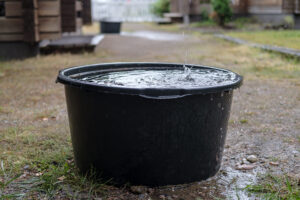 Gutters are one of those house features that you don’t really think about until they’re not there. And then you realize how important they are for directing water away from your home’s foundation. But in some cases, gutters may be unnecessary. Here are a few instances when you might be able to ditch the gutters:
Gutters are one of those house features that you don’t really think about until they’re not there. And then you realize how important they are for directing water away from your home’s foundation. But in some cases, gutters may be unnecessary. Here are a few instances when you might be able to ditch the gutters:
If you live in an area with very little rainfall, gutters may not be necessary. If your home is surrounded by trees, you may also be able to go without gutters since tree leaves will block most of the rainwater from hitting your roof.
Or when your roof has a long overhang gutters may not be necessary as they do the job of redirecting water away to a safer distance from your house. Also when you have a sloped lot, you can consider not needing gutters for your home. Your property just might fulfill your gutters job.

Can you have custom-built gutters?
 You can have custom-built gutters they will be available to fit any size or type of home. They can be made from a variety of materials, including aluminum, copper, steel, and vinyl. There are many benefits to having custom-built gutters, including increased protection from the elements and better drainage for your home.
You can have custom-built gutters they will be available to fit any size or type of home. They can be made from a variety of materials, including aluminum, copper, steel, and vinyl. There are many benefits to having custom-built gutters, including increased protection from the elements and better drainage for your home.
Takeaway
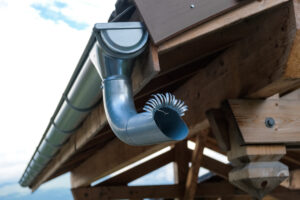 Does a house need gutters? While they are not always required, they are a good idea to have. Gutters help to protect your home from water damage and can also help to keep your foundation in good condition. If you live in an area with a lot of trees, you may want to consider installing gutters to help keep your home in top condition. Now if you’re still not sure whether you have to have your gutters installed or not, consult with our professionals from Roofs By Freedom and have them inspect your home and provide you with the best course of action.
Does a house need gutters? While they are not always required, they are a good idea to have. Gutters help to protect your home from water damage and can also help to keep your foundation in good condition. If you live in an area with a lot of trees, you may want to consider installing gutters to help keep your home in top condition. Now if you’re still not sure whether you have to have your gutters installed or not, consult with our professionals from Roofs By Freedom and have them inspect your home and provide you with the best course of action.